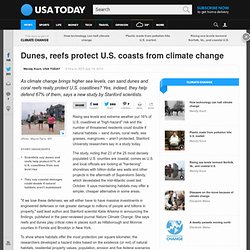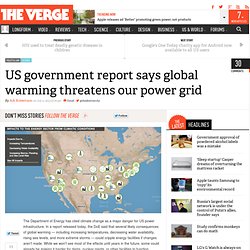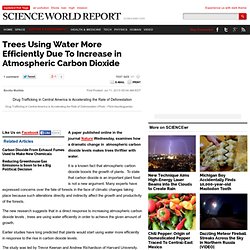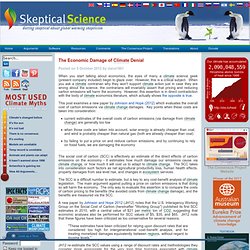

Episode 472: The One-Page Plan To Fix Global Warming : Planet Money. Camille Seaman/Barcroft Media/Landov Climate change seems like this complicated, intractable problem.

But maybe it doesn't have to be. On today's show, we talk to a couple economists about a very simple idea that could solve the climate-change problem: Tax carbon emissions. A carbon tax could be paired with cuts in the income tax. And it would drive down emissions without picking winners or losers, and without creating complicated regulations. Dunes, reefs protect U.S. coasts from climate change. Rising sea levels and extreme weather put 16% of U.S. coastlines at "high-hazard" risk and the number of threatened residents could double if natural habitats -- sand dunes, coral reefs, sea grasses, mangroves -- aren't protected, Stanford University researchers say in a study today.

The study, noting that 23 of the 25 most densely populated U.S. counties are coastal, comes as U.S. and local officials are looking at "hardening" shorelines with billion-dollar sea walls and other projects in the aftermath of Superstorm Sandy, which devastated the mid-Atlantic coast last October. It says maintaining habitats may offer a simpler, cheaper alternative in some areas. "If we lose these defenses, we will either have to have massive investments in engineered defenses or risk greater damage to millions of people and billions in property," said lead author and Stanford scientist Katie Arkema in announcing the findings, published in the peer-reviewed journal Nature Climate Change.
US government report says global warming threatens our power grid. The Department of Energy has cited climate change as a major danger for US power infrastructure.

In a report released today, the DoE said that several likely consequences of global warming — including increasing temperatures, decreasing water availability, rising sea levels, and more extreme storms — could cripple energy facilities if changes aren't made. While we won't see most of the effects until years in the future, some could already be making it harder for dams, nuclear plants, or other facilities to function.
A warmer world, the department said, can affect "key aspects" of the entire power industry for good or ill. Melting permafrost or Arctic ice could limit where onshore operations can build, though it could also make overall drilling seasons longer. Temperature increases will make almost all power plants less efficient, as well as reduce the carrying capacity of power lines. Melting permafrost could make oil pipelines unstable. Trees Using Water More Efficiently Due To Increase in Atmospheric Carbon Dioxide. First Posted: Jul 11, 2013 05:04 AM EDT Drug Trafficking in Central America is Accelerating the Rate of Deforestation (Photo : Flickr/tauntingpanda) Like Us on Facebook A paper published online in the journal Nature Wednesday, examines how a dramatic change in atmospheric carbon dioxide levels makes trees thriftier with water.

It is a known fact that atmospheric carbon dioxide boosts the growth of plants. To state that carbon dioxide is an important plant food is not a new argument. The new research suggests that in a direct response to increasing atmospheric carbon dioxide levels , trees are using water efficiently in order to achieve the given amount of growth. Earlier studies have long predicted that plants would start using water more efficiently in response to the rise in carbon dioxide levels. Impact of CO2 fertilization on maximum foliage cover across the globe's warm, arid environments - Donohue - 2013 - Geophysical Research Letters. The Economic Damage of Climate Denial. Posted on 3 October 2012 by dana1981 When you start talking about economics, the eyes of many a climate science geek (present company included) begin to glaze over.

However, this is a critical subject. When you ask a climate contrarian why they won't support climate action just in case they are wrong about the science, the contrarians will invariably assert that pricing and reducing carbon emissions will harm the economy. However, this assertion is in direct contradiction with the body of climate economics literature, which actually shows the opposite is true. This post examines a new paper by Johnson and Hope (2012) which evaluates the overall cost of carbon emissions via climate change damages. The social cost of carbon (SCC) is effectively an estimate of the direct effects of carbon emissions on the economy - it estimates how much damage our emissions cause via climate change, or how much it will cost us to adapt to climate change.
Equity Weights Discount Rates and Roberts Otters.